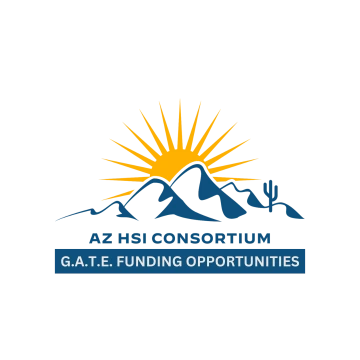The AZ HSI Consortium is pleased to announce the Embedding Culturally Responsive Practices in Support of STEM Faculty and Advisers as an inaugural AZ HSI G.A.T.E. Funding Opportunities Awardee. After careful review from colleagues across the state of AZ, Embedding Culturally Responsive Practices in Support of STEM Faculty and Advisers was shown to be an effective program in stimulating and supporting equity-focused change and research that enriches our understanding of effective and culturally responsive practices for broadening participation in STEM at HSIs.

Please read below to learn more about Embedding Culturally Responsive Practices in Support of STEM Faculty and Advisers.
Project Abstract:
The proposed HSI GATE project expands upon and seeks to sustain two culturally responsive training resources that were developed under federally funded grants and other resources. The Culturally Responsive Practices for Staff training and the Culturally Responsive Curriculum Development Institute are being developed and/or sustained under an existing Department of Education Title III award (Project CREAR). The Title III award is intended to be an institutional transformation grant where evidence-based, impactful practices and critical staff positions are ultimately funded by and embedded into the institution. Given the current financial crisis at UA, initial plans for a path to sustainability are now less certain. The training for advisers has been developed and is currently in the final review stages, with an anticipated launch date through the UA Edge Learning system at the end of 2024. However, there are not specific funds available in the Title III grant to robustly pilot the training and test its effectiveness. Funding from an HSI GATE award would allow us to implement the training broadly with STEM advisers in the Colleges of Science and Engineering (see letters of support). A GATE award would support a mixed methods research approach, utilizing already developed surveys and adding a qualitative research component through focus group interviews with advisers who attend the training. It would also allow for the synthesis of all data collected about these two interventions and inclusion in the self-assessment required as part of the UA's participation in the AAAS SEA Change project. If awarded, this HSI GATE grant would provide stipend support for 12 additional STEM faculty to participate in the upcoming institute, with matching stipends from the College of Science, allowing for additional data collection to demonstrate the trainings effectiveness for faculty in redesigning gateway STEM courses and the associated student outcomes. Further, in order to be sustainable, the training institute needs additional staff support to relieve the administrative burden currently on the faculty member who designed the institute. The GATE proposal includes staff time for Andrea Palacio, Assistant Director of Inclusive Program Design and Development for the Title III award, to be trained in the coordination and management of key administrative components required for the successful implementation of the CRCDI so that the institute can be better positioned to be sustained and embedded into UA as a high impact practice for STEM faculty.
- Jennifer Fields, University of Arizona, Office of Societal Impact, Research, Innovation & Impact Fields
Jen Fields serves as the Executive Director of the Office of Societal Impact under Research, Innovation & Impact. We challenge the research enterprise to be more inclusive, representing the diversity required to solve today's grand challenges, and to focus on impacts that translate the curiosity and expertise of researchers into policies, practices, and programs to benefit society and improve lives. Her graduate dissertation, and her career following, have been dedicated to addressing STEM equity, access, and inclusion, first through her role as VP of Education & Visitor Services at the Miami Museum of Science, and for the past 15 years, through various roles in higher education here at the University of Arizona.
Chris Oka, University of Arizona, Office of Societal Impact
Christopher Oka serves as the Assistant Director of Inclusive Curriculum Design & Development with the STEM Learning Center and the Office of Societal Impact at the University of Arizona. He leads the first-year seminar and peer mentoring interventions for the STEM Learning Communities and oversees the development of culturally responsive and inclusive practices training for staff and student leaders as part of the Department of Education Title III HSI STEM Project CREAR grant. Christopher is also a doctoral candidate at Arizona State University and an alumnus of the University of Arizona and Northern Arizona University.
Andrea Palacio, University of Arizona, Office of Societal Impact
Andrea Palacio serves as the Assistant Director for Inclusive Program Design and Development at the University of Arizona, bringing a decade of experience in academic advising and student services, with a growing focus on culturally responsive program management. Her work on Project CREAR, funded by a Title III HSI-STEM grant, centers on developing scalable and sustainable STEM Learning Communities through strategic partnerships and evidence-based interventions. As a doctoral student in the UA’s Higher Education program, Andrea bridges research and practice to advance culturally affirming and inclusive initiatives that empower diverse student populations.


